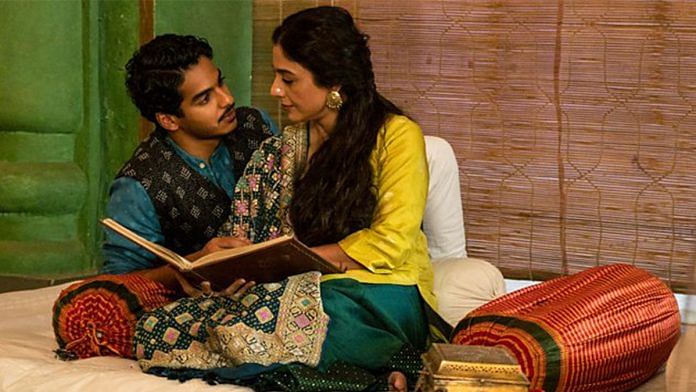New Delhi: The first episode of A Suitable Boy, a six-part series directed by Mira Nair, dropped on BBC One in the UK Sunday to an average live audience of 4.6 million. And even though it will only be available in India later in the year on Netflix, it is all anyone can talk about.
From frantically reading and revising Vikram Seth’s doorstopper of a novel, on which the show is based, to poring over reviews of the first episode, India cannot wait to see itself on screen.
For that, really, is what Seth’s sweeping 1993 classic is — an exploration of India.
Set in 1951-52, the book follows the story of four families, held together by one Mrs Rupa Mehra’s burning desire to find a worthy match for her younger daughter Lata. But it’s more than a family drama. It tells the story of a newly independent India, struggling to find its feet and stay on them, an India preparing for its first general election in the wake of freedom that came at the cost of a bloody Partition, and an India that is grappling with the ugliness of religious conflict.
At more than 1,300 pages in its original edition (later editions have gone to upwards of 1,500 pages), Seth’s novel is a massive tome, and a difficult book to adapt for the screen.
Director Nair and screenwriter Andrew Davies (who has earlier adapted Pride and Prejudice, Vanity Fair and Middlemarch among others into BBC drama serials) had their hands full, given the book is one of the longest ever written in the English language.
In fact, one of the criticisms the show has garnered after the first episode is that it feels too crunched, like a highlights reel, and that six episodes will not do it justice.
Still, many have praised the show’s production values. And of course, there is the fact that this is the first period drama in the history of the BBC to feature a cast entirely consisting of people of colour — Tanya Maniktala, Mahira Kakkar, Tabu, Shahana Goswami, Ishaan Khatter, Rasika Dugal, Ram Kapoor, to name a few.
Also read: Mira Nair to adapt New York Times story ‘The Jungle Prince of Delhi’ into Amazon series
Visually stunning but clunky dialogue and overly desi accents undo the magic
Here’s a look at what the reactions to the show have been so far:
The Guardian’s Chitra Ramaswamy said, “The production values are high, the performances poised and the locations stunning, from the dusty markets of Calcutta to the fictional university town of Brahmpur. But… It deserved at least 12 episodes. After all, Seth’s sprawling and deeply humane novel is one of the longest books in English.”
While its visual appeal and casting are remarkable, she notes the show feels “uncomfortably old-school”.
Anita Singh, the Entertainment Editor for the Telegraph, wrote, “Andrew Davies has stripped away all the fat from Vikram Seth’s enormous novel and left us with a gorgeous TV drama,” while according to The Independent’s Ed Cumming, “In depicting the dangers of Hindu nationalism, the programme also nods towards modern Indian politics. It’s refreshing to see Indian period drama grounded in a least a semblance of political reality.”
Yet he minced no words for the parts in “unforgivably flat dialogue” and added, “For all its good intentions, this is still an orange-filtered fantasy version of India, where the characters speak English with the same mannered Indian accents and nobody can do anything without a sitar twanging.”
The accents have, in fact, come under criticism from most quarters, including from Raja Sen (one of the few Indian critics to have watched the episode) , who wrote in Mint Lounge: “Here we have a cast of mostly talented Indian actors trying, bafflingly, to sound browner. The cadences are unforgivable as characters try to add weird Hindi-esque lilts to English sentences. In this day and age, for Indian actors to take a Peter Sellers approach for an adaptation of an Indian masterpiece is utterly confounding.”
He also criticised the show’s lack of flow, and while he praised some of the actors, in particular Khatter, Goswami and Kakkar, he called it a “feeble adaptation” that was “soap-operatic” and “tedious”.
On Twitter, opinions have been flowing freely since the episode began to air, and run the gamut from beautiful to painfully dull.
Very, very, very good opening episode for #ASuitableBoy. Congratulations @MiraPagliNair– lots of brave decisions & pitch perfect in a million ways. I watched with a room of people, half of whom knew India well & half of whom did not. All loved it. Tabu especially magnetic. A hit!
— William Dalrymple (@DalrympleWill) July 26, 2020
Ten minutes into #ASuitableBoy and it is painfully clear that this series was written for a predominantly white audience. And as much as I want to give it a chance, I’m too aware of its colonial/Western stereotypes. The makers could have had a lot more faith in their audience.
— Meera Navlakha (@meeranavlakha) July 26, 2020
I really want #ASuitableBoy to be good but here I am on my phone ?
— iCod (@icod) July 26, 2020
https://twitter.com/asjadnazir/status/1287491695613968397?s=20
Also read: Armed with much-loved Pakistani shows, Zindagi channel to return 27 July on ZEE5




pls make it series available in Hindi as some people cant see in english